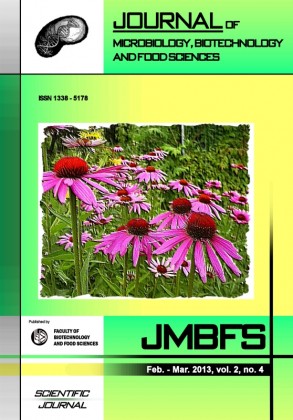RECOMBINANT PROTEIN PRODUCTION OF ABUNDANT LARVAL TRANSCRIPT (ALT-2) IN ESCHERICHIA COLI
Keywords:
Lymphatic filariasis, IPTG, plasmid stability, abundant larval transcript, shake flaskAbstract
Lymphatic filariasis is a major tropical disease caused by mosquito born nematodes Brugia malayi and Wuchereria bancrofti. Vaccine against filariasis must generate immunity to infective mosquito derived L3 stage. Two highly expressed genes designated abundant larval transcript-1 and -2 (alt-1 and alt-2). ALT-1 and ALT-2 represent closely related protein (79%) it. Now, expression of this alt gene in E. coli BL21plysS for the production of vaccine is major challenge as no vaccine is available against this disease. Work was carried out to express this protein at laboratory scale bioreactor. At first optimization of different parameter like suitability of media, inducer concentration, induction time was done for getting maximum amount of recombinant protein. In shake flask studies, after induction (max cell density and max specific growth rate stage) good expression of ALT-2 protein was found. However, at laboratory scale production done in bioreactor, expression level drastically decreased. Plasmid stability analysis was done in reactor and was found to be cause for decreased productivity. The stability was improved by increasing antibiotic concentration in the medium and also by pulsing antibiotic during induction. This led to better plasmid stability and increased expression levels in reactor similar to expression levels in shake flask studies.Downloads
Download data is not yet available.
Downloads
Published
2013-02-01
How to Cite
Ashraf, K., Ramalingam, S., Mujeeb, M., & Haider, A. (2013). RECOMBINANT PROTEIN PRODUCTION OF ABUNDANT LARVAL TRANSCRIPT (ALT-2) IN ESCHERICHIA COLI. Journal of Microbiology, Biotechnology and Food Sciences, 2(4), 2466–2480. Retrieved from https://office2.jmbfs.org/index.php/JMBFS/article/view/7504
Issue
Section
Biotechnology
License
Copyright (c) 2013 Kamran Ashraf, Subramanian Ramalingam, Mohd. Mujeeb, Amreen Haider

This work is licensed under a Creative Commons Attribution 4.0 International License.
All papers published in the Journal of Microbiology, Biotechnology and Food Sciences are published under a CC-BY licence (CC-BY 4.0). Published materials can be shared (copy and redistribute the material in any medium or format) and adapted (remix, transform, and build upon the material for any purpose, even commercially) with specifying the author(s).

